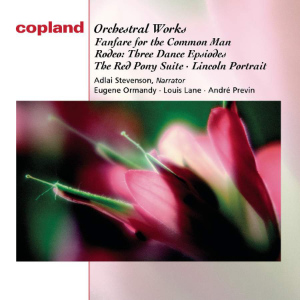
Aaron Copland (1900-1990)
Fanfare for the Common Man (1942)
Rodeo: Three Dance Episodes (1942)
An Outdoor Overture (1938)
The Red Pony: Suite for Orchestra (1948)
Lincoln Portrait (1942)
Adlai Stevenson (narrator)
Philadelphia Orchestra/Eugene Ormandy
Cleveland Pops Orchestra/Louis Lane
St. Louis Symphony/André Previn
rec. 1961-63, Philadelphia, Cleveland, St Louis
Presto CD
Sony Classical SBK62401 [64]
So far as the conductor/orchestra aspect is concerned this is an allsorts mixture. There’s nothing untoward or outlandish in that aspect. Other examples have been snipped together from all corners of a label’s treasury. Take the 1994 EMI Classics Warlock centenary album as an example and from the same company the earlier Delius ‘Festival’ CD. CBS-Sony had and has a glut of Copland recordings (analogue stereo) at its disposal and the ones chosen for the present disc, now revived by Presto (after first issue by Sony in 1996) are well up to scratch despite their age.
The mix concentrates on the works of the 1940s (or almost). This is music of the rumbustious and poetically delightful U.S. West. There is nothing of Copland’s later raids on dissonance: no Connotations, no Inscape, no Variations. The famous Fanfare (which also figures stunningly in the Third Symphony) rubs stylistic shoulders with the commandingly imperious Lincoln Portrait. The establishing and entrenching of the far Wild West style is to be found in Rodeo, The Red Pony and An Outdoor Overture. The Red Pony is a delight in the hands of film conductor and composer André Previn; the latter from a film score for the 1947 Myrna Loy/Robert Mitchum film which was shown on TV during the last year in a bleedingly colour-saturated print. The Stetson bravado and blunder rendered in bright roughened and brawling sound of Rodeo – wonderful raspberry slurring by the trombones – is redeemed by the sensitive poetry of the Saturday Night Waltz. The gentle poetry of that movement is reminiscent of Appalachian Spring and the little performed opera The Tender Land; do get to hear the opera.
If you want to delve into Copland conducting Copland you could do a lot worse than dig up some long-deleted multi-disc sets from Sony-CBS. There are three excellent volumes each: of a Copland Celebration and the somewhat older Copland Collection. There’s also the Copland volume in The Music of America series.
An Outdoor Overture is an eagerly exuberant, spring-heeled work which might have you thinking about parallel sounds and moods in Arthur Bliss’s Colour Symphony and especially of Moeran’s Sinfonietta; the latter in the still superb Lyrita/Boult/LPO version. Rhythms are rapped out with taut vigour. Highlights abound, including the fruity solo trumpet near the start.
Also, I confess to a partiality for the derided Lincoln Portrait which is a country-mile away from the Overture. A 13-minute work, it packs a giant pile-driver punch, slowly-burning and emotional. The narrator in the first performance of Lincoln Portrait was the poet Carl Sandburg one of whose poems should be experienced by all who are newly bereaved; it breaks the dams. Sandburg’s homely sing-song tones can be heard on another Sony disc with the conductor André Kostelanetz who commissioned the work.
I confess to a taste for such works, including Vaughan Williams’ Oxford Elegy, Bliss’s Morning Heroes and Prokofiev’s Eugene Onegin. Words of high poetry or high chivalric sentiment delivered by orators who can act with their voice, all woven together with music that matches the words, can be an overwhelming experience. Later narrators in recorded versions of the Portrait include Henry Fonda, Charlton Heston, Katharine Hepburn, Gregory Peck, James Earl Jones and Margaret Thatcher. The Portrait is the more telling in the present majestic version with Adlai Stevenson (1900-1965). Stevenson does not grandstand or try to portray himself as a giant among men. His majestic delivery is there but he speaks as a quietly confident dignified voice and his version is amongst the most moving.
Sony’s notes are in English only and are by David Montgomery.
With the Sony vaults stuffed with Copland works conducted by the composer, often with the LSO or New Philharmonia, the present purely American line-up comes up as fresh as paint. Recorded when the composer was in his early 60s, the sound is very good … and not just good for its time.
Rob Barnett
Help us financially by purchasing from





















